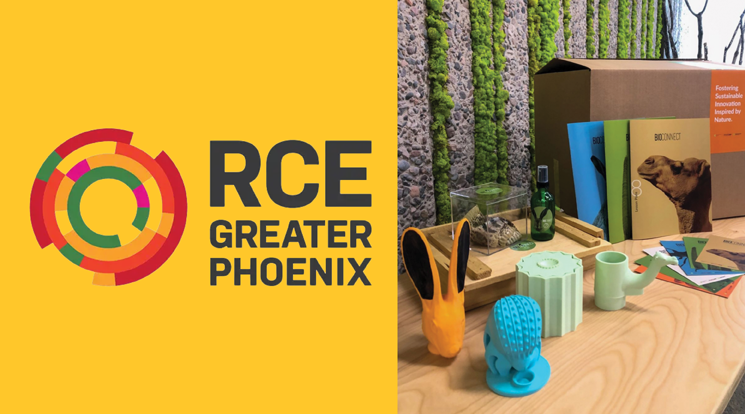Toolkits offer creative approaches to teaching sustainability

Through its spines and pleats, the saguaro has developed the ability to self-cool — a process that can teach humans about adaptability in extreme environments. These biomimicry-inspired lessons also offer educators a way to encourage students to understand their role in preparing for a more sustainable future.
The lesson of the saguaro is part of a sustainability education toolkit, BioConnect – Looking to Nature for Solutions, and one of eight inaugural toolkits that were introduced last month as part of a community-wide initiative to provide individuals, K–12 educators, professors and other organizations access to no-cost resources on sustainability topics.
The project was guided through the Regional Center of Expertise on Education for Sustainable Development – Greater Phoenix, known as the RCE Greater Phoenix. RCEs are part of a global network initiated by the United Nations University and recognized by the United Nations Educational, Scientific and Cultural Organization.
Arizona State University’s Mary Lou Fulton Teachers College, the ASU School of Sustainability, and the Julie Ann Wrigley Global Futures Laboratory, in collaboration with ASU’s Knowledge Exchange for Resilience, helped establish the center, and continue their involvement through the community-focused efforts. The toolkits were created by community organizations and ASU faculty, including from MLFTC and other interdisciplinary units.
“These toolkits represent a collaborative effort within the greater Phoenix region to design and offer resources that have strong regional connections to sustainability topics,” said Katja Brundiers, clinical associate professor with the School of Sustainability, who has been involved with the RCE Greater Phoenix as a founding member.
The sustainability education toolkits can be accessed through the RCE Greater Phoenix website. Each toolkit provides detailed summaries on the project, creators and academic alignments. The toolkit projects include:
- BioConnect – Looking To Nature For Solutions: Comprehensive lesson plans that encourage students in grades 6–8 to explore how organisms in the Sonoran desert, such as the saguaro, have adapted to extreme environments and what can be learned to create solutions for sustainability problems.
- Cultivating Mindful Connections: Approaches for implementing mindful interactions with nature that strengthens our connections to the environment and non-human beings.
- Learning Relationality for Sustainability Transformations: A framework for educators to approach sustainability learning and transformation through relationship building, knowledge co-production and stakeholder collaboration.
- Place-Based Equity Training for Sustainable Urban Development:
Ways to help learners engage with historical contexts and systemic inequities, fostering an understanding of how past injustices shape present conditions, including the need for equity in addressing sustainability challenges. - Green Participatory Budgeting for Green Schools and Colleges: Approaches for participatory budgeting, a civic learning process that empowers students to contribute to funding decisions around school-based sustainability solutions.
- Turn It Around Cards: A collection of flashcards designed by young artists and writers from around the world to prompt engagement and discussions around reshaping education toward justice and sustainability.
- Professional Development for Teachers to Build Sustainability Curricula: A guide for teachers to build sustainability courses and lessons that are based on sustainability and critical pedagogies while making these topics fun and educational. Sustainable Behavior Change Toolkit: An interactive curriculum that describes how to implement behavior change interventions to advance sustainability outcomes in an organization.
- Promoting Collaboration in City Governments: A series of trainings designed to help practitioners create more collaboration and opportunities for holistic adaptation to climate challenges within cities.
Upcoming toolkits include Professional Development for Sustainable Curricula and Participatory Budgeting for Green Schools and Colleges.
“We want to support access to high-quality sustainability education for people of all ages and for use in any setting —school, work, clubs and more,” said Brundiers, who served as Director of the RCE Greater Phoenix until recently accepting a position with the University of Freiburg in Germany. “We hope these sustainability education toolkits will facilitate a greater understanding of interrelated social, environmental and economic challenges and encourage youth — and adults — to become involved in shaping our global futures.”
The toolkits were designed to address sustainability goals and competencies needed to work toward these goals while focusing on justice, equity, diversity, inclusion and access. Toolkit co-creators represent a range of community groups, such as the Phoenix Zoo and the City of Tempe, as well faculty and students representing ASU’s MLFTC, the School of Sustainability, the College of Global Futures, and the Sustainability Teachers’ Academies. Explore more on the RCE Greater Phoenix’s website.
In addition to these resources, MLFTC supports the integration of education sustainability as part of school settings and other organizational contexts through faculty research and programs. For example, MLFTC offers an undergraduate certificate in environmental education that is designed to establish standards for professional excellence in environmental education as outlined by the North American Association for Environmental Education.
Learn more about how MLFTC is collaborating with other ASU units and the wider community on sustainability education initiatives in this Q&A interview with Iveta Silova, MLFTC professor and associate dean of global engagement: https://education.asu.edu/about/news/global-futures-sustainability-and-education